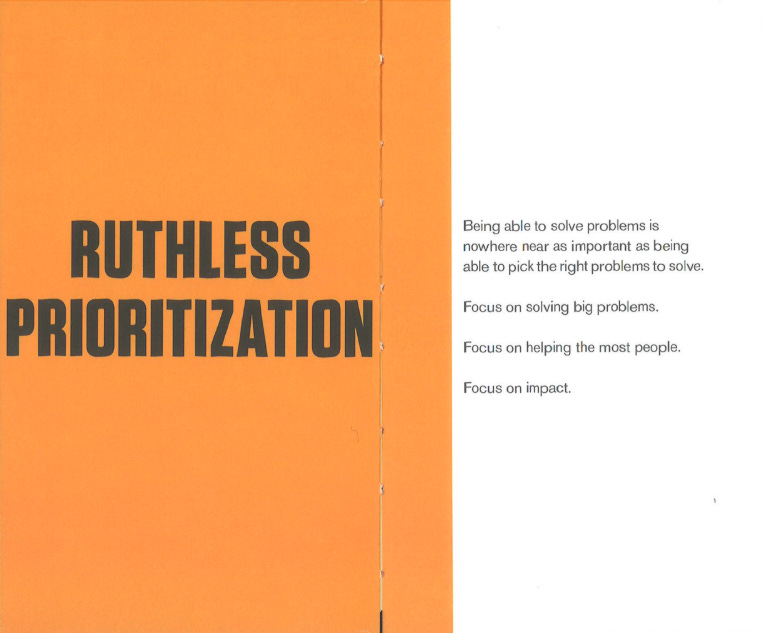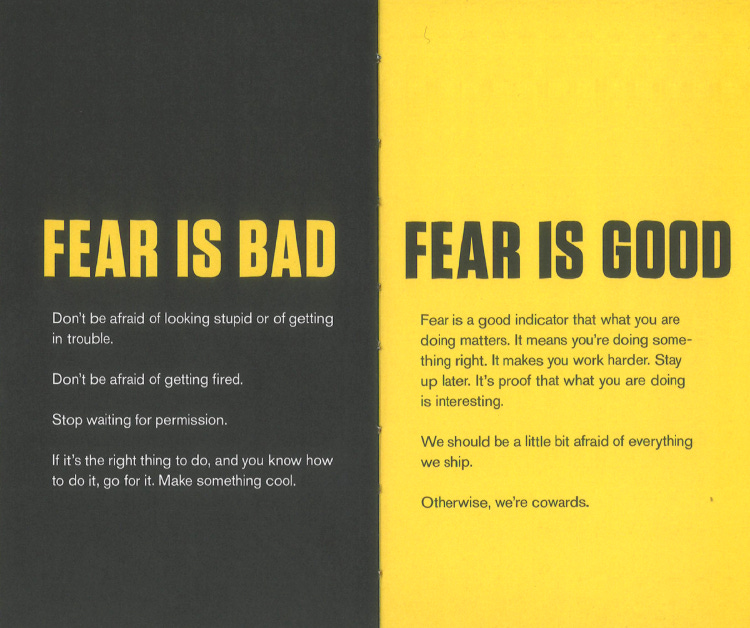Over the years, a handful of ambitious tech companies have published internally circulated “culture bibles, "revealing their guiding philosophies in a raw, unvarnished form. Netflix has its legendary Freedom & Responsibility deck, Valve has its playful, flat-hierarchy employee handbook, and Facebook had its own “Little Red Book.”
Facebook’s Little Red Book paints a company that thrives on breaking old rules to build what’s next, which is unsurprising in Silicon Valley. But I also find a paradoxical mix of paranoia and optimism — the sense that Facebook must someday create the very thing that destroys it, or risk being rendered obsolete by someone else.
I tried to mix together a few of the most distinctive pages in the book (it's really a riveting design and layout) along with some choice quotes.
Whether or not you buy into Mark Zuckerberg’s worldview, there’s no denying his ambition.
1 Hacker Way
I think this anecdote about their sign is such cool and paranoid symbolism. There's a reason Zuckerberg made Facebook's HQ address 1 Hacker Way.
“The Hacker Way is about pushing boundaries. Testing limits. Doing stuff people didn’t realize could be done. Figuring out how to do more with less—sometimes with nothing. It’s a prison shiv, not a Ginsu knife. MacGyver, not Bond. It’s function over form and survival of the fittest. It rarely asks for permission. Or validation. But sometimes it asks for a fire extinguisher. It’s putting peanut butter and jelly on a tortilla because you’re out of bread. Effectiveness over elegance. It’s the belief that there is always a way.”
Focus on impact
In most fields, it’s actually a super underrated ability to pick the right type of problems to work on. Facebook’s values reward impact, which tends to be a pretty easy way to orient people to be ambitious.
“6 months or 30 years
There is no point in having a 5-year plan in this industry. With each step forward, the landscape you’re walking on changes. So we have a pretty good idea of where we want to be in six months, and where we want to be in 30 years. And every six months, we take another look at where we want to be in 30 years to plan out the next six months.
It’s a little bit shortsighted and a little bit not. But any other approach guarantees everything you release is already obsolete.”
Move fast and break things
This really gives you a sense of Zuckerberg's most infamous creed: Move fast and break things.
"Products that don't exist rarely change the world. And until it ships, it doesn't exist. It doesn't matter how amazing it is or how clever it is if no one ever gets to use it. Ship no matter what."
Duality of fear
This is an incredibly nuanced and wise portrayal of fear.
I really love the way Steven Pressfield describes the Resistance, which is this fictional anti-creative force that plagues people and stops them from doing their (best) work. He writes how the Resistance can actually be useful as a counter-signalling device: self-doubt and fear are manifestations of Resistance, and the more fear we feel, the more important the work is to us.
And this is something that Zuckerberg seems to understand innately.
Another way of saying this is from legendary real estate investor Sam Zell:
“I have often said that fear and courage are cousins and very closely related.”
Yet another relative of fear is its cousin, paranoia — and Zuck does an incredible job channeling his inner Andy Grove (he of "only the paranoid survive"):
“If we don’t create the thing that kills Facebook, someone else will.
‘Embracing change’ isn’t enough. It has to be so hardwired into who we are that even talking about it seems redundant. The internet is not a friendly place. Things that don’t stay relevant don’t even get the luxury of leaving ruins. They disappear.”
Pretty cool stuff
We can't judge Facebook and Zuckerberg's ultimate impact yet, so it's hard to say whether they've truly built some "pretty cool stuff."
Regardless, I actually think ignorance or naivete or ambition or courage to tackle hard problems is supremely underrated.
But reading through this today, it was clear that Facebook and Zuckerberg were not lacking in ambition:
"CHANGING HOW PEOPLE COMMUNICATE WILL ALWAYS CHANGE THE WORLD
Changing how ideas spread changes how society functions, changes how people speak, changes how people live, changes how people tell stories, changes how people fall in love, changes who people consider friends, changes who people consider strangers, changes what being alone means.
“People sharing more—even if just with their close friends or families—creates a more open culture and leads to a better understanding of the lives and perspectives of others.”
The infinite game
This is Facebook's version of Disney's “We don't make movies to make money. We make money to make more movies.”
“Connection is the fundamental unit of society. And increasing the number of ways people can connect, and the number of people they can connect to, is a powerful tool for good. It blurs lines. It alters perspectives. It humanizes. Because when everyone is considered an ‘us,’ there’s a lot less ‘us vs. them.’”
“Historically, those who controlled the media controlled the message. If you’re the only one with a printing press, you control what people read. Same with radio. Same with TV.
But what happens when everyone can put their message in front of a lot of people? When the playing field is level? When everyone has a printing press, the ones with the best ideas are the ones people listen to. Influence can no longer be owned. It must be earned.”










